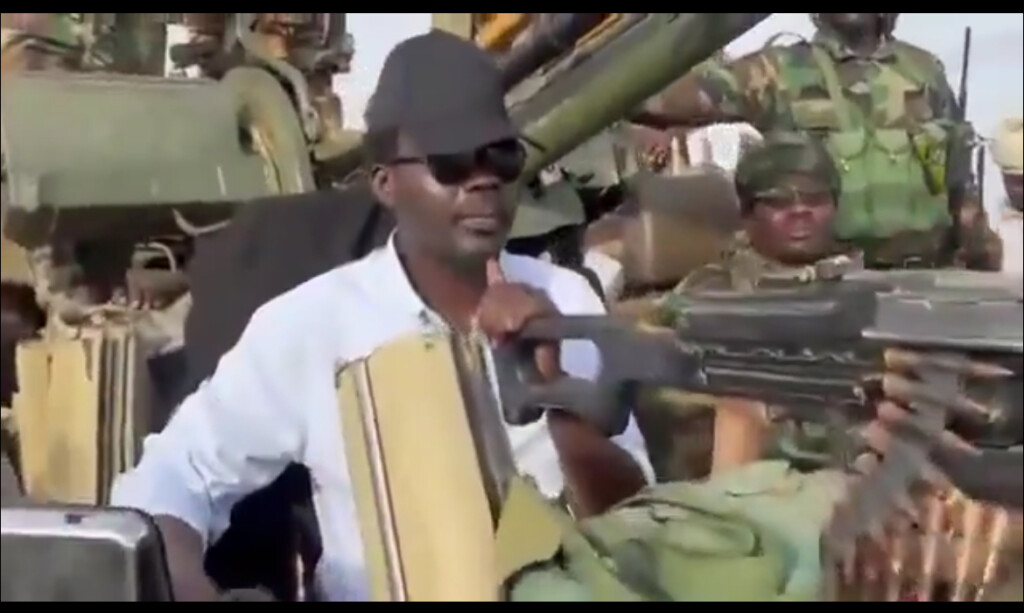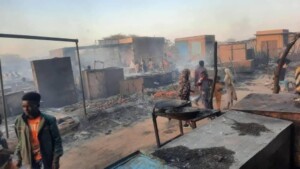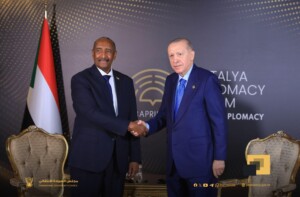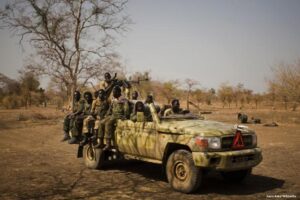Minawi’s Sudan Liberation Movement to fight alongside army

Still from a video showing rebel leader and Darfur governor Minni Minawi among his forces in Atbara, on their way to ‘free Khartoum’ from the RSF (Video: PB page of Mini Minawiy, March 24)
The Sudan Liberation Movement breakaway faction under the leadership of Minni Minawi has chosen to fight with the Sudanese Armed Forces (SAF) in its war against the Rapid Support Forces (RSF) in Khartoum and El Gezira. Gen Yasir El Atta, deputy commander of the army, repeated his refusal to negotiate with RSF commanders and told his troops in Omdurman yesterday that they will continue to fight ‘until victory’.
In a video clip posted yesterday on his Facebook page, Minawi, who is also governor of the Darfur region, appeared on board of a military vehicle among his forces in Atbara in northern Sudan, announcing their departure toward Khartoum, to participate in the battles “to expel the RSF from the country’s capital, Khartoum, and El Gezira”.
Minawi said that “all of Sudan is now fighting for the survival of the country and against the foreigners [RSF*] who are killing, plundering, and raping”. His movement is “nationalist and concerned with the people anywhere in Sudan, not only in Darfur”.
Last week, the Darfuri Justice and Equality Movement faction headed by rebel leader and Minister of Finance Jibril Ibrahim (JEM-Ibrahim**) dispatched a convoy of rebel combatants from Kassala to El Gedaref in eastern Sudan. Sudan War Monitor reported on Friday that the group, commanded by Gen Fadul Ushur, would head to the western parts of El Gedaref, where the SAF “is building up a massive force to recapture Wad Madani”, capital of El Gezira, which came under RSF control after a four-day battle with army troops on December 18.
By sending of military units to fight alongside the army in Khartoum and El Gedaref, SLM-MM and JEM-Ibrahim show a practical shift in their already announced pro-SAF position to direct participation in army operations***. They were preceded in this by the Sudan People’s Liberation Movement-North faction headed by Malik Agar, who became vice president of Sudan’s Sovereignty Council after RSF Commander Hemedti was dismissed from this position.
The heads of rebel movements that signed the Juba Peace Agreement with the Sudanese government in October 2020 were all appointed on high-level government posts the following year. Most of them supported the joint SAF-RSF coup d’état against the civilian-led government of PM Abdalla Hamdok in October 2021 and remained at their posts.
Following the outbreak of the war in April last year, many remained neutral and called for an end to the war. This was not appreciated by the SAF command in Port Sudan, currently ruling the country, which sacked El Hadi Idris and El Taher Hajar as Sovereignty Council members and Hafez Abdelnabi as minister of animal resources in November last year, and Nimir Abdelrahman as governor of North Darfur in the beginning of this year.
The SAF earlier this month managed to retake large parts of Omdurman from the RSF, and is now engaged in heavy fighting in Khartoum North. The Sudan War Monitor attributed the army’s success to superior logistics and more plentiful ammunition, precision drone strikes (Iranian Mohajer-6 drones), a more reliable pay system, and other factors.
‘No negotiations’
The SAF deputy commander-in-chief yesterday confirmed that “there will be no negotiations or truce with the RSF”.
According to the Sovereignty Council’s press office, El Atta repeated his ‘no-negotiations stance’ in his address to army officers breaking their fast, together with the Darfur Governor Minni Minawi and Acting Khartoum state Governor Ahmed Hamza, in Omdurman yesterday evening, that “this war will continue until our victory” – as “the Sudanese army does not honour a militia that has no doctrine other than murder, robbery, and rape”.
US Special Envoy for Sudan Tom Perriello told reporters on Thursday that he hopes negotiations between the SAF and RSF will resume in April.
Minawi, in his speech in Omdurman described the RSF as “mercenaries and foreign militia members”. He said that “we have waited 10 months, but no solutions have been found. Our forces will now work to contribute to returning homes to its people and sovereignty to the state”.
On Thursday, Radio Dabanga reported that Minawi agreed with the UN to facilitate the delivery of humanitarian aid from Port Sudan to El Fasher via the El Debba road in northern Sudan, which is under control of the SAF.
* The Rapid Support Forces (RSF) was created in 2013 to fight armed rebel groups throughout Sudan. Brig Gen Mohamed ‘Hemedti’ Dagalo, former commander of the paramilitary Border Guards and other janjaweed militia groups was appointed ground commander of the new paramilitary group. The majority of the RSF troops were Darfuris recruited by Hemeti in 2013 from his own Abbala Rizeigat ‘Arab’ tribe. The Rizeigat also live in Chad (rumours say that Hemedti is Chadian) and Niger, and Darfuri victims who heard RSF members speaking claim that some of them spoke foreign dialects of Arabic, which they believe to be from these two countries. The Rizeigat are one of many tribes who fall under the Jeneid (spelled Junaid when referred to the RSF business empire) and this larger group brings together dozens of tribes dwelling in Sudan, Chad, Central African Republic, Niger, Mali, Libya, and Egypt.
** In August 2023, the Justice and Equality Movement (JEM) split. Leaders of the movement accused Jibril Ibrahim, brother of JEM founder Khalil Ibrahim, of obstructing attempts to elect a new leader, and ousted him as president. Suleiman Sandal, the political secretary of the movement, became his successor. Following his election, Sandal admitted that JEM‘s participation in the military coup of October 25, 2021, was a mistake. Ibrahim last year expressed his support of the army and remained in his position as federal Minister of Finance.
*** The mainstream SLM (formerly the Darfur Liberation Front) and JEM were formed in Darfur to fend off attacks by Arab gunmen supported by the Sudanese government. In April 2003, their forces attacked the airport of El Fasher, capital of North Darfur, triggering an extremely violent response from the regime in Khartoum, which rapidly developed into the Darfur civil war, a war that in fact never ended. Already in 2004, US Secretary of State Colin Powell declared the violent conflict a genocide. This was confirmed by many, including prominent Sudan researcher/analyst Eric Reeves and prosecutors of the International Criminal Court. Following the outbreak of the April 2023 between the SAF and RSF, the latter managed to take control, without much resistance, of four of the five Darfur states in October and November last year. The Darfur Joint Forces, made up of SLM and JEM fighters, have not been able to do much. The SAF and RSF are now fighting over the remaining bastion, El Fasher.











 and then
and then